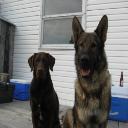Yahoo Answers is shutting down on May 4th, 2021 (Eastern Time) and beginning April 20th, 2021 (Eastern Time) the Yahoo Answers website will be in read-only mode. There will be no changes to other Yahoo properties or services, or your Yahoo account. You can find more information about the Yahoo Answers shutdown and how to download your data on this help page.
Trending News
So, what makes a dog breeding worthy?
Agility titles? Mutts can get them, as can puppy mill dogs.
Obedience titles? Ditto above.
My question is, is breeding Obedience titled dogs, Agility titled dogs, or similar "companion" titled dogs, a valid reason to breed? Assuming all other things are golden (health tests, breed experience, temperament, etc), what is considered ok and responsible? In your opinion? In your breed?
Conformation, field titles/ability, herding titles/ability, 'working' titles/ability? How bout SAR? CGC?
And in what form? Breeding only to improve the breed? Breeding titled/quality dogs not to improve the breed, but to maintain the breed? Breeding titled/quality dogs not to improve the breed, but only to sell them?
Devil's advocate - If it's to improve the breed, in companion animals, isn't breeding the best pets, assuming all proper tests are wonderful, exactly what should be done?
No TD's will be given by me for well-thought out and supported opinions.
12 Answers
- Alesi's ChisLv 71 decade agoFavorite Answer
I don't consider agility or obedience titled dogs worthy of breeding at all. Doesn't mean a great example of a breed can't earn those titles as well, but not those alone.
Since I only have a companion breed, then a conformation title assuming testing and temperament are all equal & good. I don't believe that 'improving' a breed is possible since the standard represents the ideal in a particular breed, however individual breeders can interpret that differently and pursue their own ideal of what breeding to that standard means.
A standard is what makes a breed a breed. It's the blueprint for structure, movement and temperament, and to ignore any of those things does not create the 'best' pets, only pets that may have good temperaments and are sound, but now have taken a step away from what makes the breed what it should be. There's enough pet quality pups produced in any breed in the pursuit of perfection to negate any need to breed strictly for pets
- ?Lv 71 decade ago
A breeding worthy dog has a championship at one end, at least one performance title at the other, and is as genetically clean of inherited illnesses and conditions as possible.
The conformation championship is to prove that the dog fits the description of the breed. A Komondor with straight hair isn't a good representative of the breed.
The performance titles are there to prove the dog has both a brain and a trainable personality that is stable and biddable under stress. All the performance titles (except the CGC) require qualifying scores on several occasions, which means the dog can consistently concentrate and behave correctly in a huge crowd of strangers.
Every breed has inherited illnesses and conditions. The most common are hip and elbow dysplasia, which are diagnosed after the 24th month of age by x-ray. Thyroid problems are diagnosed by blood test. Some breeds carry von Willibrands Disease, some carry other sorts of metabolic malfunction and every breed club is trying to eliminate them, some with more dedication than others.
Breeding the best dogs one can by these standards IS breeding the best pets. Do you think the show dogs you see on Animal Planet aren't pets? Of course they are. Sometimes their beloved isn't their owner, but dogs don't care who signed the paperwork.
The best pet is a dog that is healthy, lives a long life, is emotionally stable and reliable, and is trainable. That's why puppymill pups are such sorry cases: they're not healthy, they rarely live long, and they are emotional wrecks. Many get no vet care or human contact until they are sold at the retail level to the poor sucker who fell for the doggie in the window.
- 12345Lv 71 decade ago
I asked a similar question myself.
http://ca.answers.yahoo.com/question/index;_ylt=Ao...
I didn't really get an answer.
Honestly I am not sure.
My breed is a working breed, not companion, so I clearly know where I stand with that. I want a working title in my breed or actually working. Period. But the breed was intended to be a working breed.
As for other titles, I have little experience with them, so I don't know what it actually takes to achieve them. In the case of SAR, I would say yes, it would make a dog breedworthy.
CGC, no. My GSD can pass a CGC but he is not breedworthy.
The thing I like about titles is not just the title, it show the work a person has put into their dogs.
In a working breed, I want working titles. A companion breed, that is a little iffy.
As I said before, I do not feel that breeding is black and white, that a dog must have title A, B or C to be breedworthy. A lot comes down to the breed, the breeder and what they have achieved.
@ Gabbie - but with a companion breed, what is the best title? the best of the breed?
Most simply go for a show title, how does conformation relate to being a good companion?
Just a thought.
- 1 decade ago
I cannot speak for every single breed, but I can speak for my breed of choice: Border Collies. I am a purist when it comes to this breed. A BC is not a companion or a sport dog. A BC is a herding dog and that ability should be bred before all else. If they're also an exceptional flyball dog, agility athlete, etc. that's great, however if they can't herd, have no natural instinct, or are a marginal herder, there is no reason to breed. I do not think that the conformation ring should have ANY place in breeding BCs. What's being bred and shown in the conformation ring are not built to work and barely the same breed. IMO if your BC is not showing and winning ISDS open trials, they should not be bred. Period.
- How do you think about the answers? You can sign in to vote the answer.
- ClumsicalLv 61 decade ago
I personally see no problem with the breeding of mutts, just as long as the breeding has a purpose and the dog is genetically cleared before being bred. I know I don't share this thought with many others, but I quite honestly don't care.
As far as what makes a dog breeding worthy? It should be genetically clean and bred for a good purpose. Be it to make better dogs for agility, conformation, herding, working, service, whatever. Mutt or purebred.
And as far as breeding for the best pets, there are already plenty of great pets, we don't need anymore. I wouldn't even have that big of an issue with people who breed pet quality dogs if they were breeding "known to be" genetically sound pet quality dogs. It just goes to show, though, that they are in it for the money. Why waste the money getting genetic testing done for your dogs when you can just hope for the best and make thousands off the offspring?
- 1 decade ago
Well-thought out question, this had me thinking for a good, long time.
(1) Health. Above all else, the dog should come from stock with healthy hips, eyes, etc. and display these traits itself.
(2) Sound temperament.
(3) I'd say intentionally breed only purebreds that meet the above two requirements and are showworthy. There will be more than enough "accidents" to create mutts. And good breeders always have "leftover" pups that can't be shown, so there won't be a dearth of pets either.
- 4Her4LifeLv 71 decade ago
It's not about a single dog, it's about a line of dogs and a breed of dogs. A dog is worthy of being bred if it is as close or closer to fulfilling the goals of the breeder as any other dog and has a pedigree that has depth (ancestors) and breadth (siblings, half-siblings, of dog and ancestors) that "flesh out" the hidden parts of the dog's DNA and show that they are likely to produce offspring towards that goal.
Then the question becomes goal, which varies from "salable" by a puppy mill to any various working or sporting goals. For me it breaks down as follows:
-for all dogs health is important, and not just things that are often tested for but longevity, minimal cancers, hormonal normality, and a lack of any allergies or auto-immune diseases in a line are a big plus for me.
-Performance would be second on my list, I like a dog that can do stuff - this varies hugely from breed to breed as I would hate a Lab that was like my Mals in function as much as I would hate a Mal that was like my old Lab - if a dog can't perform its original function or a current, real working-dog function (SAR, assistance dog, military/police work) then it's not worth much in my estimation - and only change a breed's function if there is no other breed already suited to that function (yes, some dogs were bred for companionship and that's OK, but don't ruin a good working breed to make more lap dogs!).
- Conformation is third, still very important. This is a nod to history and to the fanciers who have been doing this a lot longer than I have, and also because I like to be able to identify a dog by breed and that's nearly impossible with so many hound-eared Labradors, red Golden Retrievers, and 18" Beagles running around. It's also because I love the look of a dog that was bred to not only do a job well, but to look good doing it... I've lost my heart to some dogs in the show ring... and because it's the easiest place to define a breed - working-lines GSDs, Mals, and Dutch Shepherds have all been bred to be very, very similar due to their new, same role but something wonderful would be lost if all Mals no longer carried their heads and necks "exceedingly proudly" and the ring lets us reward that sparkle that is icing on the cake and not functional at all, the Clumber's lumber, the Dal's distinct spots, the perfect tux on a Boston Terrier.
- ?Lv 45 years ago
Not every dog in a breed is a good guard dog, it depends on how your raise them and just nature. My sister had a 100+ pound mix dog, pitt and some other crap mixed and he was the worst guard dog in the world. If someone broke it he would roll over for a belly rub. He loved everyone. We took him out on a night walk and some odd guy try to come over to us, we went to walk away and this dog wagged and trying to go toward the guy to get some love. My dog is a chunky pup and she wont let anyone near us, she a lab/chow mix. I think it just depends on the actual dog, not so much the breed. Of course a large dog will do more damage then a yorkie.
- al lLv 61 decade ago
Health is the main thing that makes a dog breed worthy. Breed standards are not put in place for looks or for show they are put in place as a way to determine the healthiest of the breed. Mix breeding can lead to many health problems and while you may own a mutt that is completely healthy you may be lucky or the problems may not have sprouted yet. Myths such as Labs having back problems or German Shepherds having dysplasia are results of backyard breeding and have shown up within the past few decades. Documentations such as pedigrees and medical records are used to distinguish a potentially healthy dog from one that may have problems. While it's easy to assume it's unfair for the dogs bred by backyard breeders to be judged you have to consider that these backyard breeders are profiting from these dogs and will breed more unhealthy dogs as well. They do not bother to take the time or spend the money for proper medical treatment and often sell the pups too early. It's like supporting an unethical company.
- Anonymous1 decade ago
according to me the ultimate value of dog breeding is continuity of species. Humans in their crazy reasoning to control everything want to control this also.... for humans the need to have not just a physically healthy but intelligent dog, is what makes breeding so crucial. so all this - agility, obedience, health, purity is vital for dog breeding.








